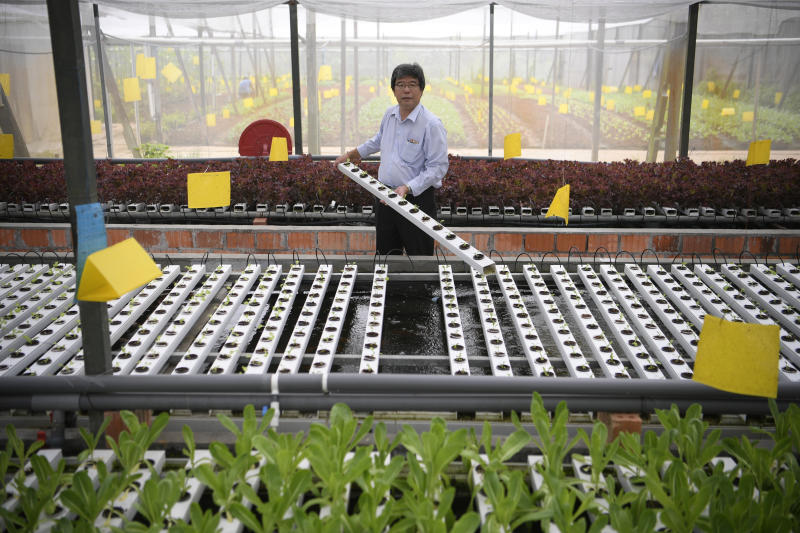Boosting food security, creating jobs and strengthening the economy through agri-tech
Sign up now: Get ST's newsletters delivered to your inbox

Mr Joseph Phua made the switch from pig farming in the 1980s to vegetable farming, and grows pesticide-free crops in greenhouses at his farm, Orchidville, in Sungei Tengah.
PHOTO: ST FILE
SINGAPORE - Singapore wants a bite of the $5 trillion global food and agri-tech pie, and is putting its money where its mouth is. It is opening up land, giving out grants and increasing education opportunities for those who want to join the sector.
And farmers here will not be like the workers of old, toiling under the sun, but highly trained individuals who use technology to do the work and to maximise harvests in limited space.
Just like Mr Joseph Phua, who made the switch from pig farming in the 1980s to vegetable farming, and grows pesticide-free crops in greenhouses at his farm Orchidville in Sungei Tengah. He has even created his own hybrid aquaponic farm to rear fish and grow vegetables. Here, the vegetables are stacked above fish tanks to cool them, while water used for the fish is filtered and pumped back into the system to water the vegetables.
More people like Mr Phua are needed.
Dr Koh Poh Koon, Senior Minister of State for Trade and Industry, said in Parliament on Monday (March 4): "Our good innovation climate, strong talent base, reputation for food safety and strategic location position us very well to capture a slice of this industry, particularly here in Asia."
The goal is for Singapore to be a leading urban agriculture and aquaculture technology hub with a food production model that can be exported to the region.
To this end, Dr Koh is leading a multi-agency team looking at how to better support the agri-tech industry in the areas of enterprise development, R&D, manpower, and regulations.
Not only will the push into agri-tech help make Singapore more self-sufficient in producing its own food, it will also create new job opportunities, as well as the chance to supply high-value solutions for urban farming to other countries.
Dr Koh announced a new 18-ha Agri-Food Innovation Park in Sungei Kadut, which would bring together high-tech farming and research and development activities, including indoor plant factories, insect farms, and animal feed production facilities. The first phase of the park will be ready in 2021, with potential for future expansion.
Farmers can also draw on funding.
The Agri-Food and Veterinary Authority of Singapore, for instance, helps local farmers through the $63 million Agriculture Productivity Fund (APF) to boost production capabilities, and appoints to each farm an account manager from AVA to advise farmers on technology adoption and such areas as business development.
Institutes of higher learning also have a key role in training farmers of the future.
Republic Polytechnic, for one, now offers a diploma in Urban Agricultural Technology.
And Temasek Polytechnic will be launching a Centre of Innovation in Aquaculture, which will pull together resources, intellectual property, infrastructure and expertise which companies and practitioners can tap to deepen their capabilities.
Dr Lee Chee Wee, Technology Advisor for Temasek Polytechnic, has been leading researchers in solving issues faced by intensive aquaculture for the past eight years.
Some of the innovations under his watch include nutritious feed to help the fish thrive in super-intensive farming, and oral vaccines to keep disease at bay.
"We're talking about a whole new industry here, and we're in a very good position to create something to benefit the world," he said.
"We've already got a head-start in areas such as water tech, and this can be applied to make fish farming more efficient."
He noted that Singapore was well placed to tackle the problems of lack of space, lack of labour and lack of water.
"All the technology that we develop to address these solutions can be exported to other countries as well," he said.
"These are problems which all countries are facing, or will face."


